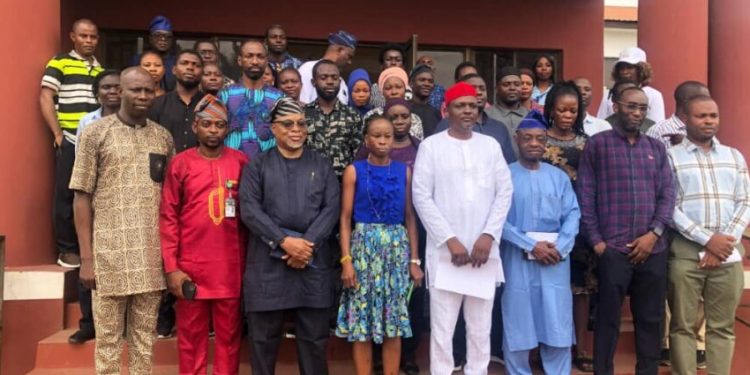The Japan International Cooperation Agency (JICA) and Kakehashi Africa Nigeria Initiative (KANI) have partnered with the Oyo State Agribusiness Development Agency (OYSADA) to train farmers and agricultural extension agents from Oyo and Lagos States in aquaponics technology, an innovative system that integrates fish and vegetable production within a single, self-sustaining ecosystem.
The two-day capacity-building programme, held in Ibadan, focused on the design, installation, operation, and maintenance of aquaponics systems. It equipped participants with practical knowledge to boost productivity, conserve water, and expand agribusiness opportunities across the Southwest region.
Speaking at the training, Senior Programme Officer at JICA Nigeria Office, Dr. Umar Alilu, said the initiative was part of JICA’s commitment to promoting knowledge exchange and advancing food security in Nigeria through technology transfer.
“The idea is to build the capacity of farmers with the new technology known as aquaponics. Through this collaboration between JICA and KANI, a network of Nigerian postgraduate alumni of Japanese universities, we’re training farmers and extension agents to combine fish and vegetable production in one system. This approach enhances nutrition, increases farmers’ income, and improves livelihoods,” Alilu said.
He explained that aquaponics enables efficient resource use by recycling water within the system. “Unlike conventional aquaculture, aquaponics doesn’t waste water. Fish waste becomes nutrients for plants, and plants purify the water before returning it to the fish tanks. It’s sustainable, efficient, and environmentally friendly,” he added.
According to him, similar pilot programmes had been implemented in the Federal Capital Territory and Benue State, with Oyo State now serving as the third demonstration site under the project.
President of KANI, Dr. Bolu Sarumoh, described the training as part of the group’s mission to strengthen the bridge between Japan and Nigeria through innovation and youth empowerment.
“Some people think innovation must be imported in expensive containers. Not here. This programme proves that local materials plus local skills can deliver global-standard results. With PVC pipes, food-grade barrels, locally fabricated pumps, and seeds from our agro-dealers, we can build efficient aquaponics systems on rooftops, in backyards, and within community cooperatives,” Sarumoh said.
He added that the training covered both technical and business aspects of aquaponics, including farm management, record keeping, marketing, and cooperative models. Sarumoh further highlighted KANI’s long-standing partnership with JICA, which began under the Shinzo Abe Initiative for African Youth Development (2013), through which many Nigerian scholars studied in Japan.
“Since then, we’ve extended our partnerships beyond academics to energy, water, and now agriculture. Our goal is to see Nigerian youths turn this training into income-generating ventures and become leaders in smart farming,” he said.
Lagos Commissioner for Agriculture and Food Systems, Mrs. Abisola Olusanya, represented by Deputy Director Akeem Olajobi, commended the collaboration for fostering regional cooperation in modern agriculture and equipping farmers with skills relevant for a changing agricultural landscape.










